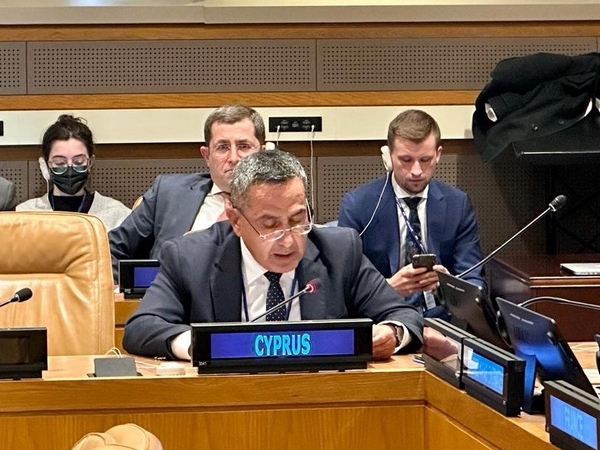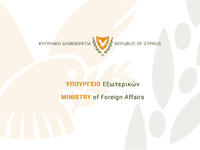Press Releases

04-05-2023 08:38
Statement by Permanent Representative of Cyprus to the UN, Ambassador Andreas Hadjichrysanthou, at the UNSC meeting on the protection of cultural heritage in armed conflicts
UN Security Council Arria formula meeting on the “Protection of Cultural Heritage in Armed Conflicts” – New York, 2 May 2023
Let me start by thanking France and the United Arab Emirates for convening this Security Council Arria Formula Meeting, with the co-sponsorship of Italy and Cyprus. I also wish to express our appreciation to our briefers for their invaluable contribution.
As stated in the 1954 Hague Convention, the “damage to cultural property belonging to any people whatsoever means damage to the cultural heritage of all mankind”. The loss is collective, and action to prevent such a loss should be therefore collective and unified.
International law stipulates that the deliberate targeting or plundering of religious, historic, and cultural sites is prohibited in times of war. The intentional destruction of cultural heritage is a war crime under the Rome Statute, it violates human rights and has a detrimental and irreversible impact on the enjoyment of cultural rights, including the ability to access and enjoy cultural heritage. In fact, through attacks on cultural heritage, perpetrators seek to uproot the cultural and ethnological connection of the local populations from their land.
Cyprus has a long and painful history of foreign invasions that led to the destruction and looting of its cultural heritage. We therefore have a long-standing priority to contribute effectively to the efforts of the international community to combat illicit trafficking, and to ensure the repatriation of stolen cultural property.
In that regard, we welcome significant developments in relation to the protection of cultural heritage, including Security Council Resolution 2347, which is the first ever resolution with a focus on the protection of cultural heritage and its important contribution to peace and security, as a source of stability and inclusion, as well as a driver of reconciliation and resilience.
Furthermore, Security Council Resolutions 2199 (2015), and 2253 (2015), and General Assembly Resolutions 73/130 and 76/16 on the “Return or Restitution of Cultural Property to the Countries of Origin” have highlighted the connection between the destruction of cultural heritage, trafficking in cultural property, and the financing of terrorism.
Upon Cyprus’ initiative, Human Rights Council adopted in 2016 a Resolution entitled “Cultural Rights and the Protection of Cultural Heritage”, supported by a cross-regional group of Member States. Cyprus is proud to be the penholder of this triennium Human Rights Council Resolution, the latest being Resolution A/HRC/49/L.8 adopted in 2022, that should be seen as complementing Security Council Resolution 2347.
In addition, during the Cyprus Chairmanship of the Committee of Ministers of the Council of Europe in 2016-2017, the Convention on Offences Relating to Cultural Property, also known as the “Nicosia Convention”, was adopted. It was indeed the landmark achievement of our presidency, since the said Convention constitutes the first ever international legal text incorporating a criminal code for perpetrators who destroy, steel or trade cultural heritage treasures. Key characteristic include the fact that the burden of proof lies with the buyer or possessor of the artifact. The Convention is open for signature and accession by all Member States. Our aim is to make this new instrument truly universal, therefore, as we are seeking today measures to protect cultural heritage we invite all UN Member States to consider acceding to the Nicosia Convention.
Turning to the issue of strengthening the implementation of existing international and regional instruments, we need to focus on accountability. The International Criminal Court’s “Al Mahdi case” is a landmark to that direction. The ICC verdict was a clear message that crimes against cultural heritage will not be tolerated and cannot go unpunished. Accountability of state and non-state perpetrators is not only essential, but a prerequisite for the protection of cultural heritage.
Mr Chair,
The protection of culture in time of conflict should be considered in a consistent and holistic manner, to better respond to attacks on culture, as well as to assist the governments in peacebuilding and recovery process. In particular, the return and restitution of cultural heritage should be seen as a conduit for peace, while support should be given for cultural protection and preservation as part of peacebuilding efforts. The adoption of gender-sensitive and inclusive approach to the protection of cultural heritage is a sine qua non.
To conclude, Cyprus, as co-chair of the Group of Friends for the Protection of Cultural Heritage along with Italy, intends to revive the Group of Friends at the very near future, to bring protection of cultural heritage at the heart of the UN system.
I thank you.
(MV/ECRH)
Relevant Press Releases

19-04-2024 16:42
PIO e-mail Αlerts service is suspended

15-04-2024 14:04
The Ambassador of Cyprus to South Sudan presented her credentials

14-04-2024 12:45
Statements by the President of the Republic


11-04-2024 19:20
Official visit of the Foreign Minister of Andorra to Cyprus


